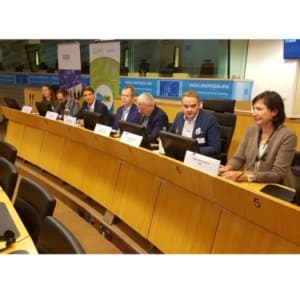2019-11-07 12:00
On November 6, CESI Youth held the 22nd edition of the CESI lunchtime event series “CESI@noon”, this time on “Apprenticeships in the EU: How to ensure a better transition from education to work?”. The event was held at the European Economic and Social Committee (EESC) and in cooperation with the German Goethe Institut and EUROCHAMBERS. This lunchtime event in the framework of the European Vocational Skills Week engaged roughly 50 participants from various sectors: policy makers and experts, civil society, youth organisations, educational partners and representatives of the business sector.
The event had 3 main objectives:
• to assess the current state-of-play in the up-take of apprenticeship schemes in the EU;
• to enable collaborative thinking and explore good practices in order to ensure more opportunities for young people’s transition to work through apprenticeships;
• to come up with policy recommendations on how to improve the up-take and the quality of the apprenticeship schemes in the EU under current frameworks, such as the New Skills Agenda and the European Pillar of Social Rights, as well as future initiatives.
The event was opened by Tatjana Babrauskienė, Member of the European Economic and Social Committee (EESC) and rapporteur of two opinions on the EU Framework for Quality and Effective Apprenticeships, and on skills mismatch, followed by an intervention Klaus Heeger, Secretary-General of CESI.
Both highlighted the contributions apprenticeships bring to the field of social inclusion and functional economic societies. Ms Babrauskienė further emphasized the importance to focus on inclusiveness and facilitating everyone’s access to the scheme regardless of gender, migrant background or social status. Norbert Schöbel, Team Leader in the European Commission for “Skills for the Young”, added that despite alarming trends in youth unemployment, the situation has improved since 2013 and continues to do so. He was glad to report that the European Alliance for Apprenticeships (EAfA) together with other EU policy and funding instruments have facilitated the #TransitionToWork for many youngsters into professional jobs or higher education.
During an ensuing panel discussion, Matthäus Fandrejewski, CESI Youth Representative, stressed the importance of getting the right career orientation in order to follow a promising career path. From his personal experience, this was the cornerstone of starting an apprenticeship, he reported. He also highlighted the need for proper wage conditions and access to an appropriate ‘in-work’ education plan in order to perform well in both areas (educational development & employment).
Jan Wilker presented the StartNet network of the Goethe-Institut on young people’s transition, highlighting the importance of cooperation across all sectors at the grass roots as well as at the political level. Overall, quality apprenticeships are good for young people’s career path, for companies’ innovation, for youth employment, for the economy and society as a whole, he stressed.
Ben Butters, Deputy CEO at EUROCHAMBRES, welcomed the recent CESI Youth position paper on apprenticeships and underlined the need for improving life-long-learning. In EUROCHAMBERS’ annual survey with responses from over 50.000 small and medium sized companies in Europe, the second biggest challenge for companies in Europe is finding workers with the right skills, he said, adding that in this context, high-quality apprenticeship schemes are even more relevant and valuable.
Key recommendations flowing from the discussions at the event were:
• Relevant stakeholders across all sectors (including parents and youth organisations, employers, education providers, decision-makers and administration as well as civil society) should be more engaged and involved in contributing to quality apprenticeships and supportive policies;
• Apprenticeships should be both inclusive and excellent, providing valuable opportunities to all young people, avoiding any forms of social exclusion or discrimination;
• Career guidance and orientation is needed to reduce mismatches, as well as communication about quality apprenticeships as a first choice, acting against stigmatisation and wrong stereotypes;
• Empowering young people to voice their concerns themselves and to contribute to quality apprenticeships must be a central objective
• More funding opportunities for stakeholders in education/ employment/ support organisations at European and national levels is necessary;
• Reducing the administrative burden to increase the up-take of apprenticeships would be desirable;
• Creating more incentives for businesses to boost the up-take of apprenticeships is needed;
• Creating local and regional support networks for apprenticeships is of central importance;
• Improving the image of apprenticeships via campaigns could give them additional, much-needed visibility and public recognition.
The event ended with the conclusion that apprenticeships can provide suitable solutions to many current or future economic and societal challenges, and that such provisions depend on the support and action from all stakeholders, in policy and practice. These main ideas are also highlighted in the CESI Youth position paper on ‘Bridging education and the world of work – with a focus on apprenticeships’.
This Twitter moment may also serve as a summary covering main aspects of the event.
Picture: CESI Youth Representative Matthäus Fandrejewski moderating CESI’s last CESI@noon panel © CESI 2019



